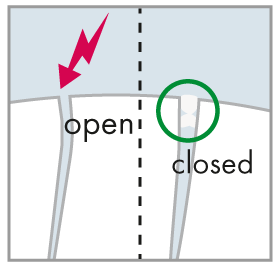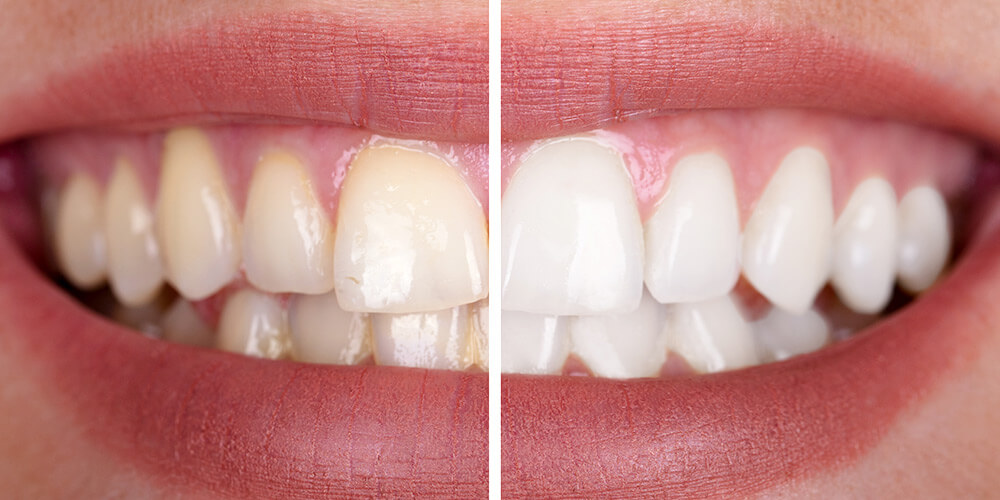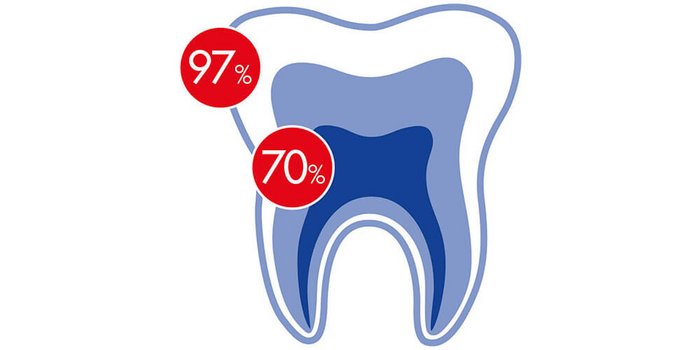Hydroxyapatite and BioHAP – the teeth's protective shield
Hydroxyapatite is the hardest substance in the human body. This mineral forms the basis for teeth and bones.Dentine is made up of approx. 70% hydroxyapatite. At around 97%, the concentration in the overlying enamel is even greater. The crystal structure and the arrangement of the crystallites in the enamel result in the high fracture strength of our teeth.
As such, hydroxyapatite is of central importance when it comes to protecting the teeth and ensuring good dental health. Whilst the mineral is harder than gold, it is not indestructible. Our teeth are subjected to chemical and mechanical attacks on a daily basis, e.g., from acids in foods, tooth grinding and overzealous brushing. Over time, the minerals are released from the enamel and the tooth substance shrinks. This frequently results in sensitive teeth. Since hydroxyapatite is an anorganic substance, it cannot be recreated by the body.
Biomimetic hydroxyapatite – or BioHAP for short
Even though hydroxyapatite cannot be rebuilt by the body, it can be created artificially. BioHAP is the abbreviation for biomimetic hydroxyapatite. The principle of biomimetics describes the transfer of phenomena from nature to technology. A well-known example is the hook and loop fastener, which was inspired by the burdock plant genus and has become an integral part of our everyday life.
BioHAP is produced in laboratories and is very similar to the hydroxyapatite produced in our body. That's why, this substance makes a particularly interesting addition to dental care products such as toothpaste, mouth washes and gels.
5-fold effect of biomimetic hydroxyapatite
The microcrystalline structure of BioHAP forms a protective layer on the tooth surface during dental care. Acids and bacteria find it harder to adhere to the tooth and thus firstly attack the applied protective layer and not the enamel directly.
BioHAP also counteracts tooth demineralisation by releasing calcium during bacterial acid attacks, this neutralises the acids and keeps the pH level in the mouth normal. The enamel is remineralised and caries is prevented.
Moreover, the BioHAP occludes exposed dentinal tubules which transmit external stimuli – such as cold, heat or acid – to the tooth nerve. BioHAP thereby works effectively to prevent sensitive teeth.
Strengths of BioHAP and hydroxyapatite
Discover the advantages of BioHAP by clicking on the circles

Protection against acids:

BioHAP forms a layer on the tooth which protects against acids.
Remineralisation:

BioHAP remineralises (repairs) the enamel and thus prevents caries.
Calcium release:

BioHAP releases calcium to counter bacterial acid attacks.
It thus protects the tooth against demineralisation.
Reduces sensitivity to pain:

BioHAP occludes exposed dentinal tubules.
Caries and periodontal prophylaxis:

Bacteria find it far harder to adhere to the tooth thanks to the BioHAP protective layer.
• Whitening:

Biomimetic tooth whitening. HAP builds up on the tooth and, as a white active agent, leaves the teeth looking brighter.
The following may also interest you:

Caries: How to protect your teeth
Caries is one of the most common diseases in the world. Find out more about the caries and its causes.

Sensitive teeth – when enjoying food becomes impossible
Sensitive teeth are often caused by exposed tooth necks or defects in the dental enamel, find out more about this.

Tooth discolouration and tooth whitening
Tooth discolouration is essentially a cosmetic issue. Discover what methods are available to get your teeth looking white again.



